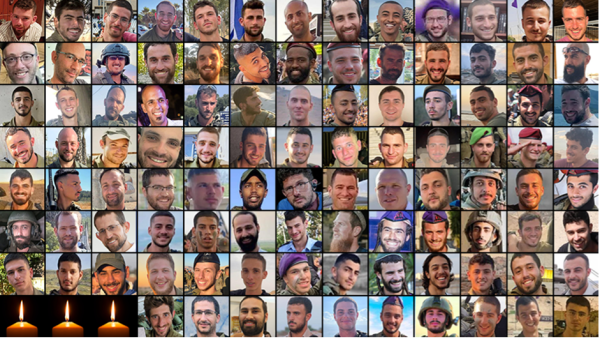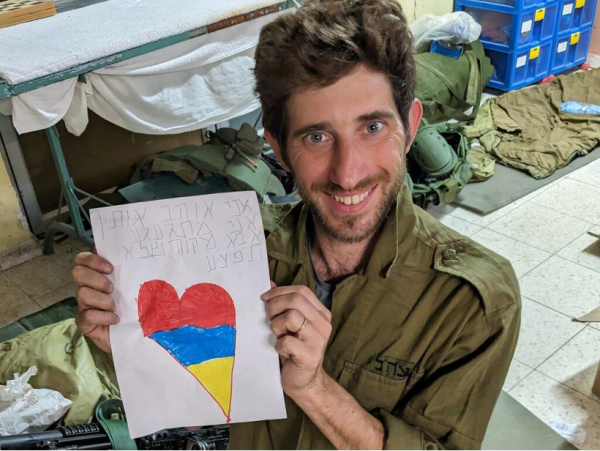By Leah Garber
“Tzav 8,” an emergency call for military service, is an order every Israeli is familiar with—a nationwide state of emergency that requires all soldiers to leave everything behind and report immediately to reserve service for an indefinite period.
Whether one is a student nearing graduation, in the middle of a post-army trip to the Far East, sowing a field before the first rains, preparing to launch a new start-up project, rehearsing for a new show, or an “ordinary” parent, who returns home every night in time for their kids’ bath and story time, Tzav 8 disrupts life’s daily routine for everyone. More so, it instinctively speeds up the heartbeat. For how long will one be gone? What will they be facing? Will they be back?
Since the ground operation in Gaza began six weeks ago, 101 Israel Defense Force (IDF) soldiers have been killed in battles.

A heartbreaking collage of beautiful faces. An eternal bond of warrior brothers who responded to the call to stand up and defend home without hesitation. They came from far and near, left their families behind, put their lives on hold, and reported to defend the homeland. They knew the risks, but wore their army uniform with great pride, demonstrating a noble willingness to sacrifice their lives—and indeed, many did.
The phrase “authorized to publish” that opens newsflashes, brings an immediate, terrible sense of dread. In the second before the names are revealed, there is a fear of the unknown. Do we know today’s dead? For which family has life changed beyond recognition? In whose home will death, an uninvited guest, suck the air out of the room, leaving a heavy curtain of endless grief, of eternal pain?’

One of them is Itai Perry from the city of Modi’in. Itai left his wife Hila and their two children at home. While in Gaza, his son sent him a drawing of a heart with this inscription: “I love you. I miss you. Dad, I hope you don’t get hurt.” Proud of his son’s letter, it became the last one he ever held.
Another, 22-year-old Ben Zusman from Jerusalem, left a will for his family with a friend. Ben’s parents received the will after he was killed. It reads:
I am writing this message to you on the way to the base. If you are reading this, something must have happened to me. As you know me, probably no one is happier than me right now. It was not for nothing that I was on the verge of fulfilling my dream soon. I am happy and grateful for the privilege I will have to defend our beautiful land and the people of Israel.
Even if something happens to me, you don’t have my permission to sink into sadness. I had the privilege of fulfilling my dream and vocation and you can be sure that I am looking down at you with a big smile. I will probably sit next to grandfather, and we will catch up, sharing our experiences and what has changed between wars. Maybe we’ll also talk a little politics, I’ll ask him what he thinks.
If God forbid you sit Shivah over me, make it a week filled with friends, family, and fun. Let there be food, meat of course, beers, cold beverages, grains, tea, and, of course, mom’s cookies. Tell jokes, hear stories, meet my other friends you haven’t seen yet. Walla? I’m jealous of you. I would like to sit there with you and see you all.
Another very, very important point: If God forbid, I’m taken into captivity, alive or dead. I am not ready for even one soldier or citizen to be harmed because of some deal for my release. You do not have my permission to conduct a campaign or struggle or anything like that for my release. I’m not willing for terrorists to be released in exchange for my life or body. In no way, shape, or form. Don’t break my words, please.
I’ll say it again: I left home without even being called to serve. I am full of pride and a sense of mission, and I have always said that if I must die, I wish it would be in defense of others and the country.
Jerusalem, I have placed guards [on your walls], that one day I will be one of them.
Gal, son of Minister Eisenkot, and a former IDF chief of staff, was killed last Thursday in Gaza. On the day he was buried, Maor, his cousin, Minister Eisenkot’s nephew, also was killed in Gaza. A brother and a sister, each a bereaved parent, bury their sons a day apart, and an entire country cries with them. The war is painful and long. Our soldiers have been fighting a harsh battle for nine weeks already, and the end is not in sight.
Worry takes over, becoming another body part, clinging to every breath, not letting go. The air is thick, sunlight is deceptive, every routine act seems meaningless in the face of the anxieties and fears we have for the fate of our loved ones.
But life must go on, and families gather night after night to light Hanukkah menorahs together—the light now more important than ever. Will the candles’ light illuminate the darkness of Gaza nights? Will it banish the terrible evil that disrupted our lives beyond recognition 66 days ago? Will it reach the tunnels and breathe hope into the hearts of the 137 hostages who are still in captivity and whose fate is unknown?
Each night, while standing by our menorahs, my imagination sails away behind enemy lines. So close, yet so far away.
What are our boys doing now? When did they last eat? Did they get any sleep last night? Are they able to light Hanukkah candles to feel the spirit of the holiday, or must they rely on us to carry on the festivity while they, just like the Maccabees 2,200 years ago, fight for our freedom, our lives, our future?
Happy Hanukkah.
Leah Garber is a senior vice president of JCC Association of North America and director of its Center for Israel Engagement in Jerusalem.
Reader Interactions